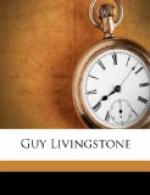It was a close struggle, indeed, between life and death. The fire of the fever died out when there was little left for it to feed on. The arm which, a month ago, was fatal as old Front-de-Boeuf’s, had not strength enough in its loosened sinews to lift itself three inches from the coverlet.
Guy had fallen at last into a heavy sleep. The doctors said it was the turning-point. If he woke quite calm and sane, the immense power of his constitution would probably enable him to rally; if not, the worst that could be feared was certain.
He woke after many hours. There was such a stillness in the room as he unclosed his eyes that you might have heard his mother’s heart beat as she sat motionless by his bedside. They recognized her at once—heavy and dim as they were—for he tried to turn his head to kiss her hand that lay on the pillow beside him. Then we knew that he was saved; and I saw, for the first time, tears stream down Lady Catharine’s worn cheeks. She could check the evidence of her grief better than that of her joy.
He saw me, too, as I came forward out of the shadow. “Is that you, Frank?” he said, faintly. “How very good of you to come.” We would not let him speak any more.
On the third day after the change for the better, I was alone with the invalid. He turned to me suddenly, and spoke in a low voice, but so steady that it surprised me. “Frank, what have you heard of Constance?”
Had I been arming myself to meet that question—disciplining my voice and countenance for days, only to fail so miserably at last? I felt unspeakably angry and self-reproachful when I saw that my face had told him all.
“When did she die?” He went on in the same measured tone, without taking his eyes off me. I think he had nerved himself just enough for the effort, and was afraid of breaking down if he paused.
I could speak now, and told him. I was going on to tell him, too, how calmly and happily her life had ended (her aunt had written all this to Lady Catharine), when Guy stopped me—not coldly, but with a hopeless sadness in his accent very painful to hear. “Thank you; it is meant kindly, but I would rather not speak of this, even to you—at least for some time.”
His self-command carried him through bravely, but it only just lasted out. Then he turned his head aside and threw his arm across it. As I drew back to the window, I saw the quivering of the long, emaciated fingers that veiled his face. I did not look again till Guy’s voice called to me, quite composedly, for I did not dare to pry into or meddle with the secrets of the strong heart that knew its own bitterness so well.
I told Lady Catharine what had passed. She was very much relieved to hear that it was all over. She never opened her lips on the subject to her son; indeed, though those two understood each other thoroughly, there were wonderfully few confidences between them.




